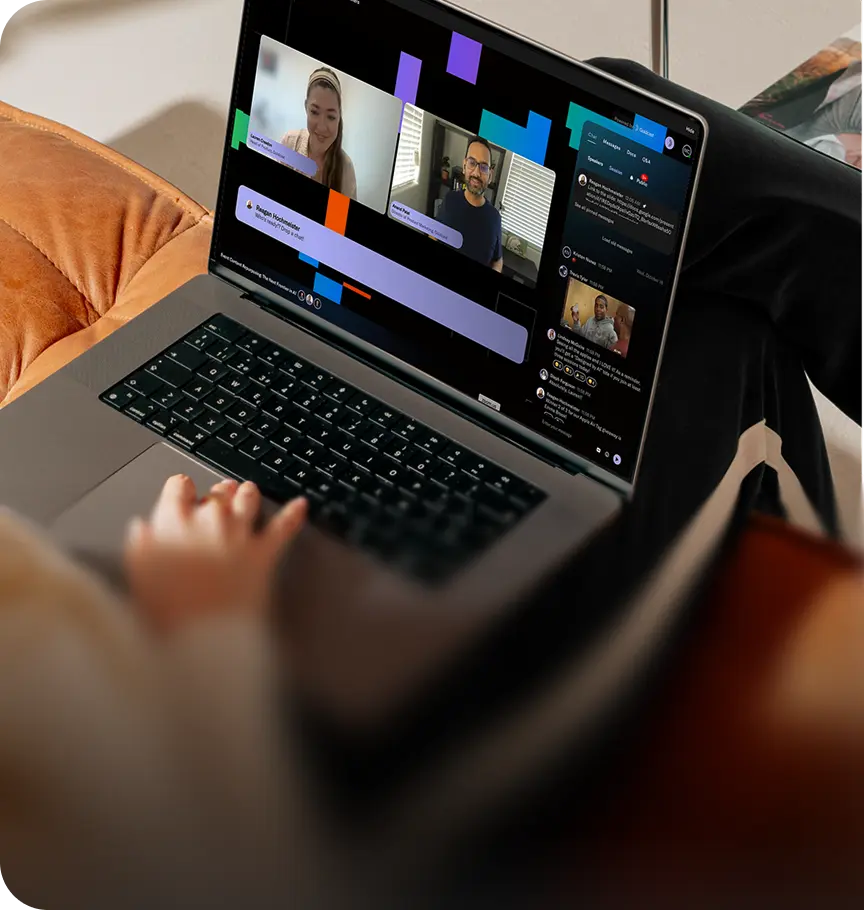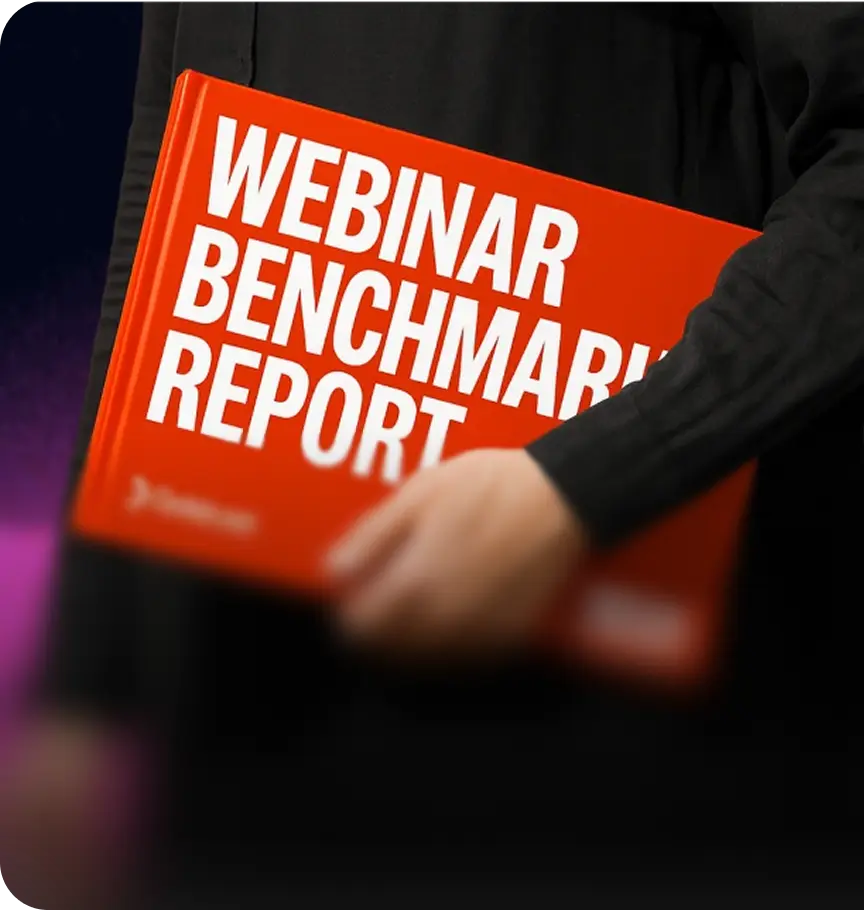The Top 30 Interview Questions for B2B Event Marketing Roles

Table of Contents
- 30 event marketing interview questions every employer should ask
- Head of Events interview questions
- Event Marketing Manager interview questions
- Event Coordinator interview questions
- What are the different event marketing roles you can hire for?
- Identify talent. Interview for potential. Invest in success.
Maximize Your Marketing ROI
Join 10,000 other marketers already getting the best tips on running engaging events that boost pipeline and create raving fans.
Finding a rockstar event marketer can make or break your demand gen success.
Take the fact that virtual events and experiential marketing are cited as two of the top five trends leveraged by modern marketers. If you don’t have an event marketing megastar up your sleeve to execute your plan, you could find yourself struggling to keep up with the competition.
With demand for talented event pros projected to grow a whopping 18% from 2020 to 2030, you’re making a wise decision to start your search for an event marketing mastermind early.
But how do you actually go about finding the right event marketing hire for your team? And once you’ve got your list of top candidates nailed down, how do you know they’re going to be able to deliver on your goals?
Understanding the role you need to fill and asking the right event marketing interview questions alongside it are the two best places to start.
Table of contents
- 30 event marketing interview questions every employer should ask
- What are the different event marketing roles you can hire for?
- Identify talent. Interview for potential. Invest in success.
👉 Not quite at the interview stage just yet? No problem! Take a step back and really think about the role you’re looking to fill with our guide on How to Write an Epic Event Manager Job Description.
30 event marketing interview questions every employer should ask
Although it may seem like many event marketing roles cover the same ground, the areas they focus on and the level of depth they go into tend to differ.
Our event marketing role examples below fall into the following categories. But this role is evolving all the time. It’s up to you to set the right scope and set of expectations based on what makes sense for your organization today.
- Head of Events — high-level strategy
- Event Marketing Manager — all about ownership
- Event Coordinator — execution and support
When it comes to hiring your next event pro, the event marketing interview questions you’ll be asking will likely vary from head to manager to coordinator.
And that can seem quite overwhelming if you’re not a well-versed recruiting pro.
But, don’t sweat it — we’re not leaving you high and dry (come on, would we ever?).
We’ve listed the 10 best event marketing interview questions per role so you can find just the right rockstar for your team.
Head of Events interview questions
Ice-breakers
- What do you enjoy most about the world of events?
- How do you stay current within the event industry? What influencers, groups or publications do you follow?
- What types of events do you usually use within your event strategies? What makes you prefer them?
Management style
- Tell us about a time you mentored a direct report and the impact you had on their development.
Skills to look for:
- Leadership
- Motivation
- What would you do if a team member consistently overruled your ideas?
Skills to look for:
- Communication
- Values fit
Interpersonal skills
- Have you ever had to coordinate with individuals outside your direct team or even organization? How did you connect and remain on task? What collaboration tools did you use?
Skills to look for:
- Collaboration
- Project Management
Event marketing skills
- How do you measure the effectiveness of your event strategies? Tell me about an event where you had a pipeline or revenue goal to hit.
Skills to look for:
- Analytical skills
- Data and revenue-driven
- How would you report to stakeholders to ensure buy-in is secured and your strategy is understood?
Skills to look for:
- Communication
- Budget management
- Stakeholder management
Problem-solving questions
- Tell me about a time your strategy hasn’t worked. What did you do about it?
Skills to look for:
- Quick-thinking
- Adaptability
- Innovation
- Risk-taking
The tech check ✅
- What functionalities do you look for in your event technology? What marketing systems are you already familiar with?
Skills to look for:
- Well-informed
- Experienced

Event Marketing Manager interview questions
Ice-breakers
- What’s one thing you love about your current role?
- You’ve been in the events industry a while now. How did you end up here?
Management style
- How do you ensure your team is well-briefed on their tasks? Explain how you’ve used a Delegate Management System (DMS) in the past to ensure your event is well-handled?
Skills to look for:
- Knowledge of industry terms
- Experience with essential tech
- Understands team member needs
Interpersonal skills
- How would you manage remote communication to ensure sponsors, partners, vendors, and internal teams feel connected to your event?
Skills to look for:
- Team player
- Prioritizes the stakeholder experience
Event marketing skills
- When and how would you decide if to do a co-sponsored event with a partner? What criteria do you use to assess if they’re a good fit?
Skills to look for:
- Understands the culture
- Knows the value proposition
- What marketing techniques do you use to promote your events?
Skills to look for:
- Creativity
- Understands full-circle marketing
Problem-solving questions
- Describe an event that didn’t go so well. What happened and what did you learn?
Skills to look for:
- Honesty
- Adaptability
- Ownership
- How would you deliver an engaging event on a limited budget? Tell me about an event where you had to think outside of the box to deliver an experience.
Skills to look for:
- Creativity
- Prioritization
The tech check ✅
- Finding quality event sponsors, suppliers, and partners can be a challenge. What’s your process for evaluating 3rd party vendors?
Skills to look for:
- Research
- Negotiation
- What do you take into consideration before you start planning an event?
Skills to look for:
- Process-driven
- Organized
- Preps for all eventualities

Event Coordinator interview questions
Ice-breakers
- How many events do you plan per year? How do you manage your calendar?
- What are some of the popular venues or platforms you recommend?
Management style
- Describe your leadership style under pressure. What’s your approach to working with cross-functional teams?
Skills to look for:
- Fair
- Takes initiative
- How do you ensure all team members stick to assigned timelines for their tasks and roles?
Skills to look for:
- Delegation
- Communication
Interpersonal skills
- How do you promote team spirit on-the-day (when things can get a little chaotic)?
Skills to look for:
- Team mentality
- Positive attitude
Event marketing skills
- How do you juggle competing priorities? What criteria do you use?
Skills to look for:
- Logical
- Good at prioritizing
Problem-solving questions
- How do you manage on-the-day event stress? What do you do to stay calm and keep the rest of your team calm too?
Skills to look for:
- Ability to work well under pressure
- Bigger-picture mentality
- Have you ever found yourself in a glitchy tech situation mid-event? Describe the situation and how you resolved it?
Skills to look for:
- Agile thinker
- Always has a backup plan
The tech check ✅
- How would you level-up the attendee experience at a virtual event? Tell us about a time where you’ve successfully managed and engaged a remote audience.
Skills to look for:
- Passionate about the attendee experience
- Innovative
- What tech and tools do you use to manage event tasks?
Skills to look for:
- Attention to detail
- Knowledge of project management tools

What are the different event marketing roles you can hire for?
Today’s event marketers come with many different titles and responsibilities. That’s largely because there’s little alignment across the industry on titles and job specs.
So while what you call your event roles is ultimately up to you, we’ll offer a little more clarity on the three main event marketing roles most companies are looking to fill.
Role #1. Head, Director, or Vice President of Events
Sitting at the top of the event pro pyramid is the Head of Events (a.k.a. the Director or Vice President of Events). This is your Chief “Big Picture” Person — all about setting the strategy, verifying the vision, and inspiring the team of marketeers making it happen.
Head, Director, or Vice President of Events roles and responsibilities include:
- Setting the overall event strategy for the organization.
- Connecting events, marketing, and sales strategies to formulate the ultimate account based management strategy.
- Implementing standard operating practices to ensure event insights are funneled to the departments that can best use them.
- Overseeing high-level event execution.
- Setting event strategy goals and ensuring they align with wider company objectives.
- Reporting on event results: key performance indicators, pipeline attribution, and return on investment.
- Analyzing event metrics and adjusting event strategies accordingly.
- Recruiting, hiring, managing, coaching, and enabling Events Managers to carry out the event strategy.
- Outlining annual and individual event budgets.
- Creating powerful partnerships with sponsors, vendors, and other departments within the organization.
- Making high-level purchasing decisions including your virtual event platform, venues, catering, etc.
- Creating an enticing event calendar.
As event marketers, we're very performance-based. We look very closely at pipeline and bookings numbers associated with events. We now know that events are influencing 75% of the pipeline for all of our campaigns.” — Sarah Reed, Senior Director of Global Strategic Events, Zendesk
Role #2. Event Marketing Manager
These folks are your seasoned event pros.
A great event marketing manager will take your strategy and vision and start adding color to it, while closely overseeing the event from start to finish.
A strong event marketer has their pulse on every aspect, from pre-event marketing, to on-the-day content and post-event analysis. If it impacts the overall event experience, it falls into the event marketing manager’s all-encompassing sphere.
Event Marketing Manager roles and responsibilities include:
- Managing event budgets.
- Determining the objectives that support the event strategy.
- Creating the marketing strategy for the event.
- Curating and refining the event schedule: sourcing keynote speakers and entertainment, reviewing content, allocating rooms and booths, etc.
- Selecting vendors, sponsors, and partners.
- Delegating smaller planning assignments: sourcing and sending event swag, designing and branding the event platform, registration and checking-in process, etc.
- Updating the customer relationship management (CRM) system to provide sales with attendee-level insights.
- Ensuring on-the-day event staff are trained within their function.
- Translating event data into insights for relevant sales follow-up.
The charter of field marketing is to create as many experiential moments as possible with buyers, to increase their intent sign, and to give our sales team the greatest likelihood of receiving a response. When we think about what channels are at our disposal to create those memorable moments, events are one of the ultimate ways to do it.” — Nina Butler, Senior Director of Revenue Marketing at Alyce
#3. Event Coordinator
Meet your event execution experts.
With your strategy sorted, planning perfected, and oversight activated — it’s time to hand the reins to your event coordinators.
No detail is too small for these specialists and no task too large. Give them a brief, timeline, team, and some tools — and a good event coordinator will have your event running like clockwork for the duration. (And if hiccups do occur, they make pretty savvy firefighters too. 🙌🏻)
Event Coordinator roles and responsibilities include:
- Monitoring the registration and attendee journey, optimizing where necessary.
- Owning pre-event communications: increasing attendance by building excitement and minimizing access issues.
- Reviewing and elevating event branding and content.
- Staffing relevant roles and managing personnel: chat moderation, booths, troubleshooting, tech support, backstage aides, speakers, entertainers, sponsors, data analysts, social media managers, videographers, designers, content creators, etc.
- Purchasing event essentials: technology, event swag, catering, seating, venue, etc.
- Keeping the event running on time.
Identify talent. Interview for potential. Invest in success.
If you want to keep up with the competition, events must be part of the plan.Not only that, they also have to be expertly executed to achieve the revenue you’re after. And you can’t do it alone.
If your event strategy is going to deliver long term, you have to hire the right person (or people) to make it happen. And it all starts with asking the right questions.

Transform Your Video Marketing with AI
Stay In Touch
Platform
Resources
© 2026 Copyright Goldcast, Inc. All rights reserved.





 Upcoming Events
Upcoming Events Event Series
Event Series On-Demand Events
On-Demand Events

